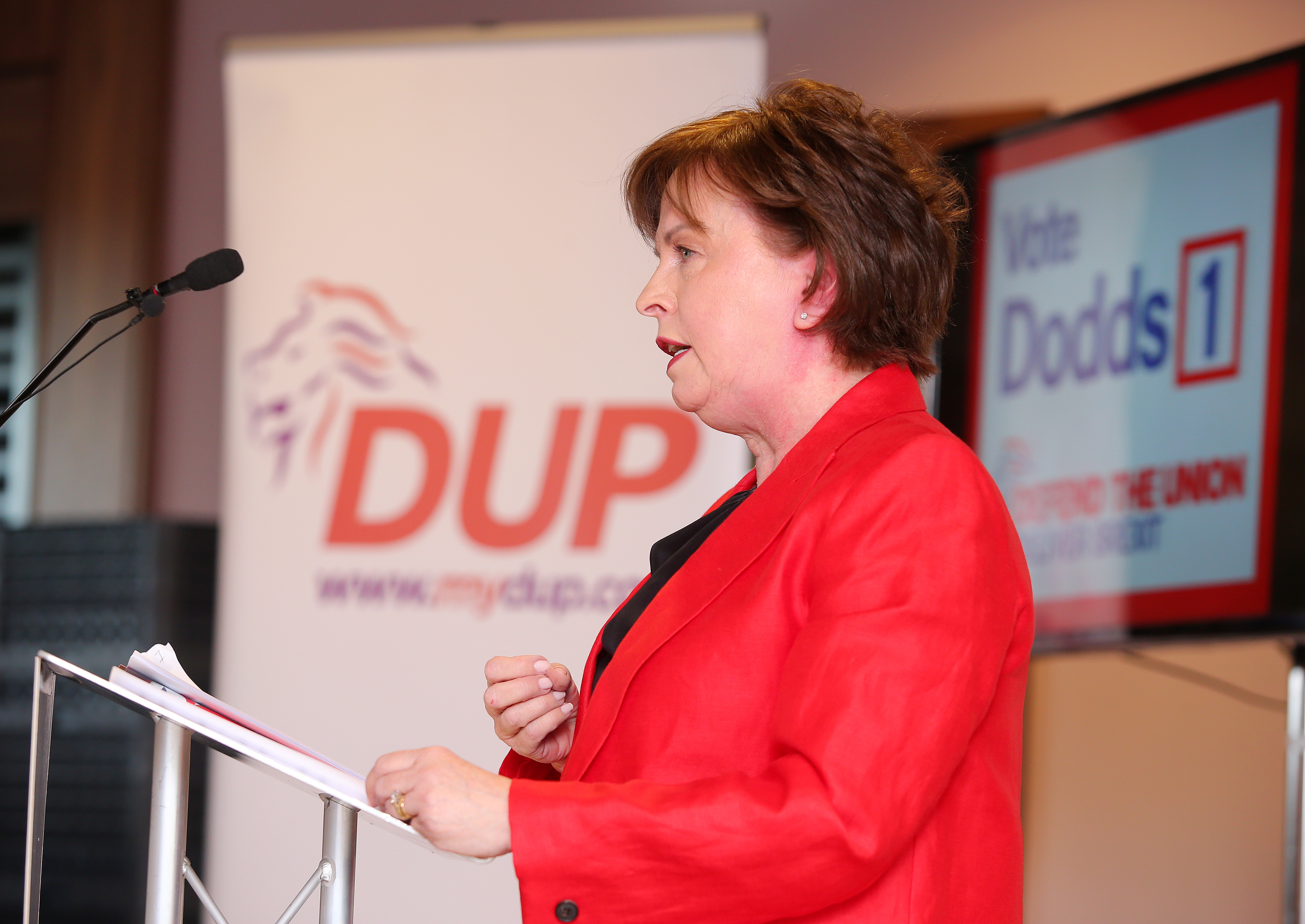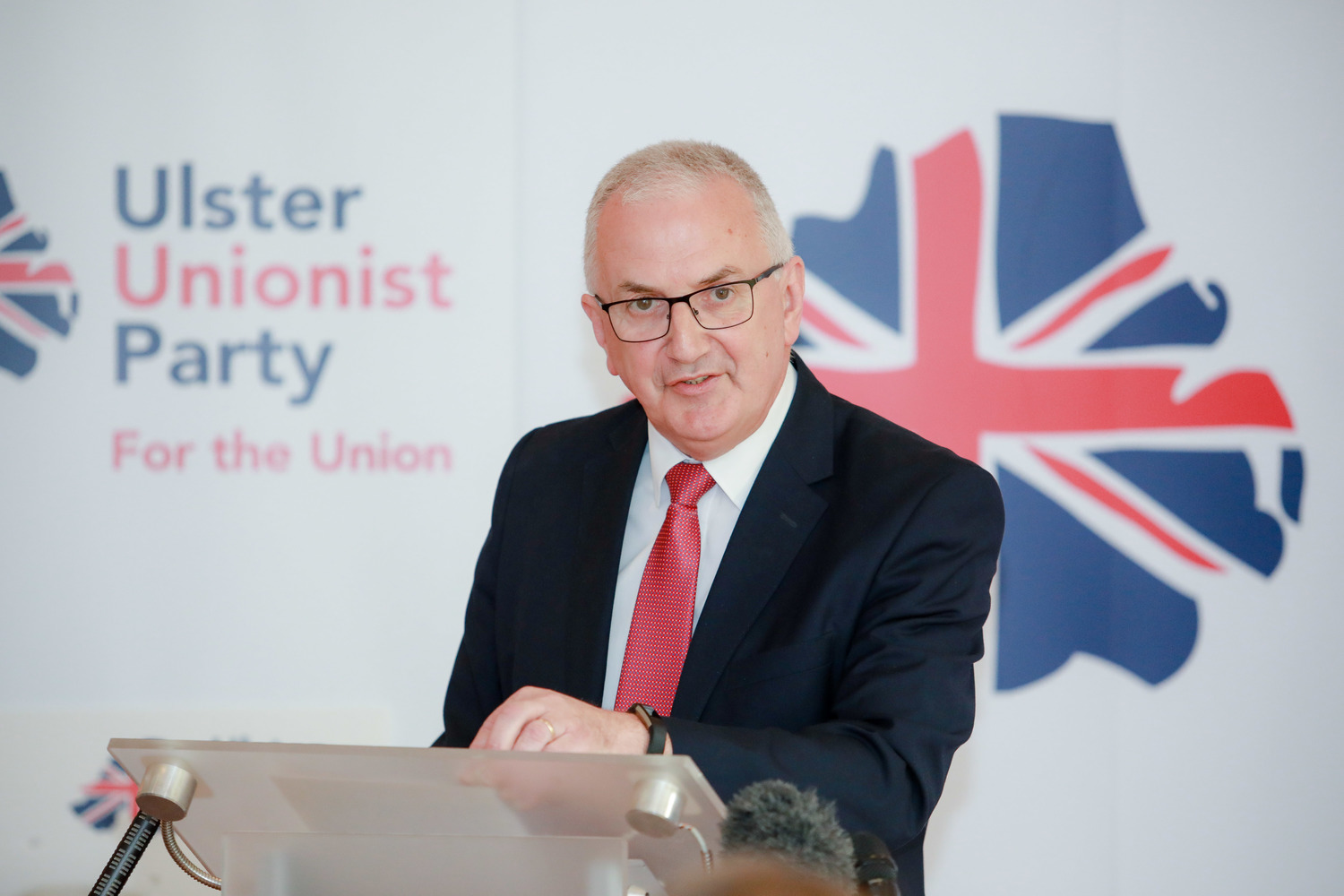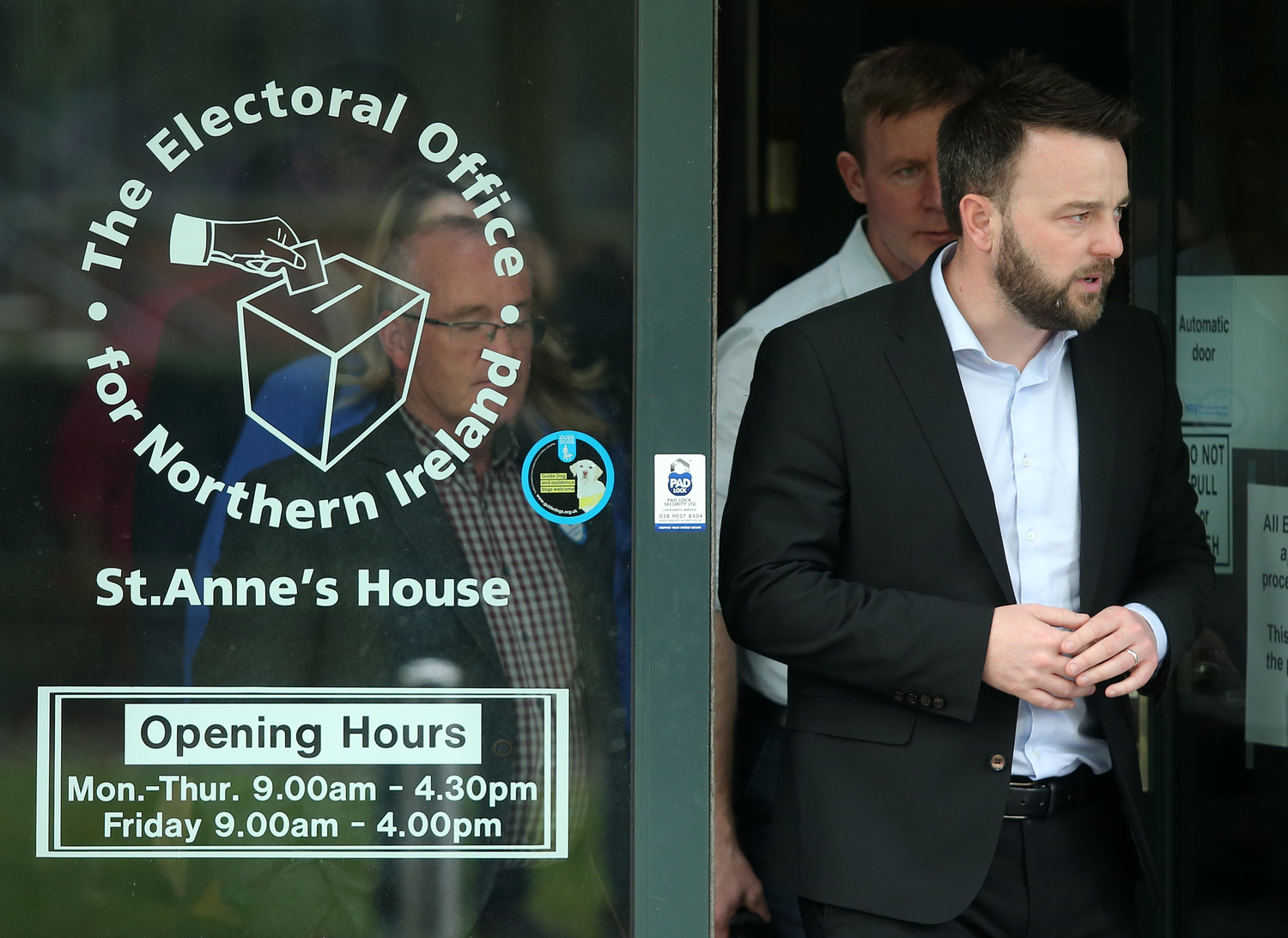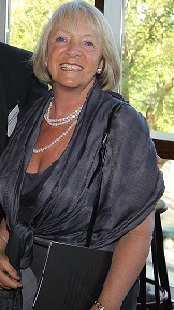ON Thursday Northern Ireland will go to the polls to select three members to sit in the European Parliament in Brussels - 1,064 days after the UK voted in the referendum to leave the EU.
When the voting opens at 7am on May 23 – five months before the latest Brexit deadline of October 31 – the electorate in Northern Ireland will have the choice of 11 candidates; the majority are pro-Remain.
Although 17.4 million people across the UK backed Brexit in June 2016, in Northern Ireland 440,707 voted to Remain, surpassing the 349,442 who opted to Leave.
In an analysis article published by The Detail today, commentator Paul Gosling remarks: "This choice of candidates creates problems for both Leave and Remain supporters. How should a Leave-supporting nationalist or republican exercise their vote? And what about a Remain-supporting unionist?"
The chart compiled by The Detail below shows the Parliamentary constituency Remain/Leave breakdown from the EU referendum.
With voters punishing the Conservative Party, who lost 1,334 seats, in the local council elections across the UK earlier this month and to a lesser extent Labour who lost 82 seats over the ongoing Brexit deadlock; the outcome of the European elections will undoubtedly be significant for Brexit and the future of politics both in Britain and on the island of Ireland.
Those battling for election are:
Sinn Féin’s Martina Anderson topped the poll in the last European Parliament election in May 2014 and was elected at stage 1 surpassing the 156,532 quota by 3,281 votes.
The Derry politician is opposed to Brexit and would actively campaign to Remain in the EU if there is a second referendum/people’s vote – as Sinn Féin did last time.
She told The Detail: “Brexit is a disastrous policy made worse by the refusal of the British Government to recognise its impact on Ireland and their responsibilities under the Good Friday Agreement. The approach by the British government has created delay, uncertainty and instability.
“Brexit has changed the dynamic on Irish unity and the reunification of our country is now a mainstream issue. The devastating consequences of a no-deal Brexit are so catastrophic that, in that context, the only logical thing to do would be to call a unity referendum in the short-term. A reunited Ireland would immediately be permitted back into the EU so the people should be allowed to decide their own destiny.”
Five years ago the DUP’s Diane Dodds, who has been a MEP since 2009, polled 131,163 first preference votes - falling 25,369 votes short of the quota.
She secured the second seat with a combination of first preference votes and transfers from excluded candidates.
Diane Dodds was elected at stage 7 of the process after receiving 668 votes from the exclusion of the NI Conservatives' candidate, 14 transfers from the Sinn Féin surplus, 1,619 transfers from the exclusion of the Green Party and Aspire to Better candidates, 6,325 transfers from the exclusion of the UKIP candidate, 3,218 transfers from the exclusion of the Alliance candidate and 36,293 transfers from the exclusion of the TUV’s Jim Allister.
Speaking as the DUP’s European election manifesto was launched last week, pro-Brexit Mrs Dodds said: “I recognise that within unionism there was a divergence between leave and remain. However, our common unionism means we can all unite in respecting the result and that we should leave as one United Kingdom.
“I recognise that many nationalists and others within Northern Ireland voted remain. However, I believe we should all unite around a belief in democracy and thus the result should be implemented.”
John Garry, Professor of political behaviour at Queen’s University Belfast, believes “two of the seats in the upcoming European Parliament elections in the Northern Ireland three-seat constituency look predictable. Martina Anderson of Sinn Fein topped the poll last time and looks set to be returned, along with another incumbent – Diane Dodds of the Democratic Unionist Party (DUP).”
In an article for thinktank The UK in a Changing Europe, he added “an exciting tussle is looming for the final seat”.
A European seat has been held by the Ulster Unionist Party’s Jim Nicholson since 1989 who has decided not to contest the election. He was elected at stage 8 of the process in 2014.
Polling 83,438 first preference votes, he got across the line thanks to 980 votes from the exclusion of the NI Conservatives' candidate, 8 transfers from the Sinn Féin surplus, 2,246 transfers from the exclusion of the Green Party and Aspire to Better candidates, 5,628 transfers from the exclusion of the UKIP candidate, 6,959 transfers from the exclusion of the Alliance candidate, 36,733 transfers from the exclusion of the TUV’s Jim Allister and 22,218 surplus votes from the DUP’s Diane Dodds.
Instead the UUP has put forward former Newry and Armagh MLA Danny Kennedy as their EU elections candidate.
Professor Garry explained: “Kennedy will face stiff competition from Colum Eastwood, the leader of the moderate nationalist Social Democratic and Labour Party (SDLP), as well as Naomi Long, leader of the cross-community Alliance party. Two other party leaders are also running in this heavyweight contest – Jim Allister of Traditional Unionist Voice (TUV) and Clare Bailey of the Greens."
Danny Kennedy is pragmatic in his response to The Detail about Brexit: “The days of remainers and Brexiteers are over; we accept the democratic outcome of the referendum.”
He said the UUP believes a second referendum “would be deeply divisive”and leaving the EU with no deal is “not an option”.
“We must leave with a deal that secures our future prosperity, the constitutional integrity of the United Kingdom and respects the result of the referendum.”
THE PARTY LEADERS STANDING
SDLP leader Colum Eastwood – another pro-Remain candidate – said his party would like to see a second referendum.
In the 2014 EU elections, the SDLP’s Alex Attwood won 81,594 first preference votes.
“The SDLP supports a straight forward question in Theresa May’s deal or Remain,” Mr Eastwood told The Detail. He added that if a Withdrawal Agreement is not ratified by the UK Parliament by the latest deadline of October 31st, he would prefer to see Brexit delayed.
“The best solution is the solution chosen by people in Northern Ireland – to Remain in the European Union.
“There is no such thing as a good Brexit. And Westminster has demonstrated on several occasions that there is no majority for any kind of Brexit. In those circumstances, it would be an act of political and economic self harm to continue with this madness.”
Alliance leader Naomi Long is another pro-Remain candidate hoping to capitalise on her party’s success in this month’s local council elections. Alliance increased their council seats from 32 to 53.
She told The Detail: “There’s no such thing as a good or sensible Brexit. While the Withdrawal Agreement is not perfect, the backstop must be banked, as it remains the bottom line insurance policy to protect Northern Ireland in the event of Brexit. However, if we can stop Brexit then we must seize the opportunity.”
Alliance would like to see a ‘preferendum’ – a single transferable vote (STV) ballot paper with three options; the Prime Minister’s deal, Remain and no deal.
Anna Lo secured 44,432 first preference votes for Alliance in 2014’s EU elections.
Also pro-Remain, in support of a second referendum and delaying Brexit in the event of the Withdrawal Agreement not being backed by Parliament, Green Party leader and EU candidate Clare Bailey believes “Brexit is politically impossible to deliver.”
She continued: “It is opportunist to hide behind the notion that the people have spoken and now we need to deliver. I see it very differently. Not only have the people split down the middle but also the devolved nations/regions are split, where two voted to remain and two voted to leave.
“A sustainable outcome can only be achieved through building consensus and this will take time. We need open and honest debate between people, government and business to explore the impacts fully.”
The Green Party candidate Ross Brown had 10,598 first preference votes in the last EU election.
The TUV’s Jim Allister, an ardent Brexiteer, will be hoping to improve on the 75,806 first preference votes he received in the last EU elections. By the end of stage 6 he had only managed to secure 10,214 transfers from the exclusion/surplus of other candidates. His exclusion at stage 7 propelled the DUP’s Diane Dodds over the quota.
Speaking this week, Jim Allister said: “While a deal would have been preferable, no deal is now the only realistic option that will induce serious negotiations from Brussels.
“Now is not a time for weakness but for strength and determination. And such vision and stoic resolve will be required in abundance from the UK’s MEPs. Now is not a time to be timorous, nor equivocal but to demonstrate tenacity, born of conviction and belief in Brexit.”
THE OTHER CANDIDATES IN THE RACE
Pro-Brexit, against a second referendum and willing to leave the EU with no deal, UKIP candidate Robert Hill wants Northern Ireland to remain an integral part of the UK.
He told The Detail: “The Government has put itself in a no win situation, some would say deliberately, either through ineptitude or the deliberate will of desperate Remainers at the heart of all the main parties.
“To truly deliver the democratic will of the people as expressed through the 2016 referendum our government should immediately reject article 50 as the trap that it was. Set to keep the United Kingdom tied to the European Union and not as portrayed as a means of leaving.”
In the 2014 EU elections Henry Reilly stood for UKIP and attracted 24,584 first preference votes.
Two independents are also seeking election to Europe – both are pro-Remain.
Neil McCann is in support of a second referendum which would give voters the choice of two questions; Remain or "such deal" as adopted by the British Parliament.
He explains: “My remain position is within a reformed EU, slimmed down, enhanced democracy and geared towards strong nations, fair trade, research policy and phasing out of nuclear power and weapons.”
Women's Coalition founder Jane Morrice, who has a ‘People’s petition of concern’ on change.org, is calling for special recognition for Northern Ireland to stay in the EU as part of the UK.
A supporter of a people’s vote, she told The Detail: “We should keep everything as is – funding, Erasmus, Horizon 2020. Because what is bad about Brexit – not only does it close the door on the best trade deal the UK could ever have, it closes the door in the face of opportunity in Europe. Europe is much more than money and markets – it’s art and culture."
The final candidate is Amandeep Singh Bhogal from London who is standing for the Conservative and Unionist Party.
Although he did not respond to numerous attempts by The Detail to contact him, it is known that he is a Brexiteer and has been photographed on the campaign trail with Boris Johnson – one of the Conservatives tipped to replace Theresa May.
In a recent post on his Twitter account Mr Bhogal said: “We ‘village idiots’ knew what we were voting for. Two options on the ballot paper. Leave or remain. We voted to leave the EU including CU (customs union), SM (single market), ECJ (European Court of Justice), CAP (Common Agricultural Policy), CFP (Common Fisheries Policy) and secure open borders. Leave means Brexit. Brexit means exit.”
The Northern Ireland Conservatives secured the lowest amount of first preference votes in the 2014 EU elections (4,144).
Professor John Garry said: “The European Parliament election is significant in terms of providing an electoral signal of Northern Irish views on the issue of Brexit. Will two of the seats be won by staunchly anti-Brexit parties? If so, this will likely be read as a buttressing of the pro-Remain position of Northern Ireland, further manifesting the distinctive position on this part of the United Kingdom, and contributing to the picture of a UK whose component parts are pointing in different directions.
“The election is also an important indicator of the state of Northern Ireland’s politics. The election will take place in the challenging context of the continued absence of power-sharing government in Northern Ireland, as the two main parties’ mutual distrust and acrimonious disputes continue and they focus on wider issues – Brexit at Westminster for the DUP and Irish unity for Sinn Fein.
“Will there be a consequent reaction among voters, in terms of increased support for broadly middle-ground parties and a decline in the overall DUP/Sinn Fein vote share? If so, this may be read as a protest against the perceived dysfunctionality of the non-functioning executive.”
For a full breakdown of the 2014 EU election results click European-Election-2014-Result-Sheet_1 (1).docx
- In his latest analysis for The Detail, commentator Paul Gosling outlines how the European elections are further evidence of how Northern Ireland is different from Great Britain.
- To read John Garry’s analysis, which was published under the title 'The European Elections and Brexit' for the UK in a Changing Europe, click here and view pages 23-24.











